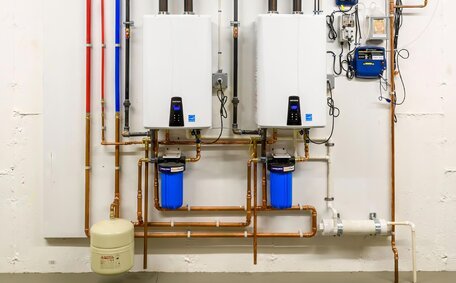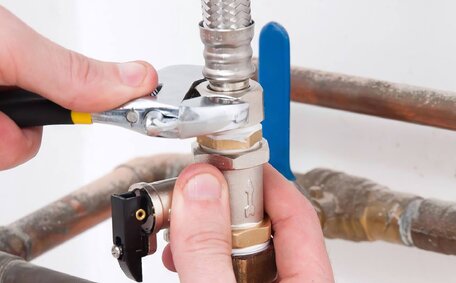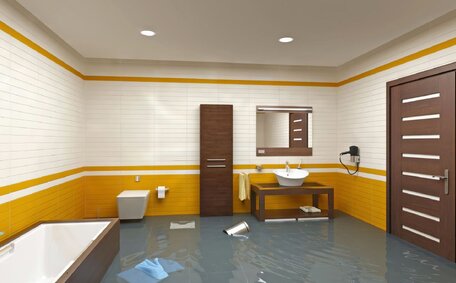Introduction to gas leaks and explosions
A natural gas leak occurs when gas escapes from pipes or appliances, potentially leading to devastating consequences similar to the East Harlem tragedy. If these gases reach high enough levels combined with an ignition source like a pilot light or electrical spark, an explosion can occur.
A minor breach in a gas line can allow hazardous gases like methane to accumulate indoors, where even a spark could trigger an explosion.
A gas leak poses serious risks, including fire, explosion, carbon monoxide poisoning, and asphyxiation. Over two Americans die weekly from accidental carbon monoxide poisoning not related to fires, as reported by the American Academy of Pediatrics. Additionally, numerous people were injured, experiencing significant distress.
This article from Bella Vista Plumbing, serving Bella Vista, Sydney, will delve into what do gas leak risks entail, how to detect them, safety precautions, and actions to take if you suspect a natural gas leak in your residence.
What causes gas leaks in the home
Several common causes contribute to gas leaks in homes:
- Faulty appliances like stoves, ovens, hot water systems, and dryers: Issues like cracked heat exchangers or broken supply lines can allow gas to leak.
- Damage to natural gas pipes: Pipes can corrode, be punctured by digging or construction, develop flaws, or loosen at joints and fittings.
- Undetected leaks: Gas lines can be damaged during natural disasters like earthquakes. Leaks in unused areas may go undetected.
- Material failure: Factors like ground shifting and the inevitable wear and tear from weather and time can cause pipes and fittings to fail.
Natural gas suppliers add a 'rotten egg’ sulphur compound known as mercaptan to aid in the detection of gas leaks by their distinctive odour. If you detect a 'rotten egg’ odour without a known source, it’s wise to consider it a sign your nose is alerting you to a potential gas leak. Call the local fire department or emergency services immediately if you sense a leak in your surroundings.
Bella Vista, as an older suburb, is more likely to have aged systems that are at an increased risk of gas leaks due to natural wear. Leaks here embody the same potential danger of gas leak, though they may be less impacted by natural disasters.
Faulty appliances
Faulty gas appliances are a major source of gas leaks. Issues like broken valves, loose fittings, and cracked heat exchangers allow gas to escape. Common appliance problems that can leak gas include:
- Stoves with faulty or damaged burners, valves, or internal pipes
- Defective gas dryer connections and hoses
- Faulty water heater tanks, flues, and internal components can also result in leaks
- Clogged oven vents preventing combustion gases from properly venting
Improperly fitted gas appliances increase the risk of leaks that could jeopardise the entire gas supply. Connections must be meticulously sealed with no gaps to stay natural gas safe. Properly applying pipe dope and tightening fittings can prevent leaks.
Lack of maintenance leads to wear tear over time, which can cause gas leaks, especially after gas appliances have been in use for extended periods. Annual inspections by a licenced technician are strongly recommended to identify issues early.
Damaged pipes
What causes a gas leak in your gas system at home? There are several common sources of damage including:
- Construction work that accidentally strikes or punctures main gas lines
- Ground movement or soil settlement placing stress on pipes
- Tree roots growing into and disrupting underground pipes
- Corrosion from moisture and chemicals both inside and outside the pipes
External damage is a particular concern since it can go undetected. Look for signs such as dead vegetation along gas line routes which may indicate a leak. Inspect for leaks immediately if pipes have been impacted by digging, demolition, floods, etc.
Environmental conditions such as extreme cold, with freeze and thaw cycles, can cause pipe exteriors to crack, while hot climates can dry out and weaken pipe materials.
It’s important to monitor your home for natural gas pipeline vulnerabilities in high-traffic areas like roads or construction sites where they experience more wear. Scheduling periodic leak detection is wise, especially for older piping systems.
Signs of a gas leak
To spot a potential gas leak in your home, watch for these well-known warning indicators:
- A "rotten egg" odour, where a spark can ignite gas present, is due to the addition of mercaptan by natural gas companies for easier leak detection.
- Hissing, whistling, or roaring sounds coming from gas appliances or pipes.
- Dead or dying vegetation in an otherwise moist area along a gas line.
- Flames coming from the ground or burning above gas appliances.
- Dirt or debris being blown into air from a hole or crack in the ground is a sign of a possible gas leak.
- Unusual odours in or around your home.
If a gas leak is suspected, be aware that exposure can cause symptoms such as headaches, dizziness, nausea, and eye irritation. Have everyone leave the area right away if you suspect a gas leak is indicated by any of these common signs.
Immediate Actions to Take if a Gas Leak is Suspected
If you suspect a natural gas leak your home, follow these important steps:
- Evacuate the area immediately. Evacuate the building, switch off electrical appliances, and open all doors and windows on your way out. Do not operate any light switches or electronics.
- Call 000 from a safe location, and follow the instructions provided by the operator when reporting the suspected gas leak. Emphasise it is a gas leak so hazmat responders are dispatched.
- If a gas leak is detected, contact a professional service like Bella Vista Plumbing at 1300 349 338 to shut off the gas service lines.
- Do not re-enter the premises until emergency crews and/or professionals affirm the absence of a gas leak in your environment. Gas can linger for hours.
- Schedule assessment and repairs. Damaged gas lines or appliances need professional attention, a cornerstone of natural gas safety, to prevent future issues.
- Installing gas leak detectors is a wise safety measure, which will alert you with an alarm when excessive levels of methane or carbon monoxide are detected.
Gas leaks are extremely hazardous, and what do gas situations entail could result without proper evacuation and emergency shut-off measures. Attempting to find or repair a gas leak on your own risks a gas leak explosion from sparks igniting the gas. Let professionals handle assessment and repairs.
Can gas leaks cause explosions?
Absolutely. Gas leaks introduce flammable gases like natural gas or propane into areas where a natural gas explosion can occur if an ignition source is present. Should the gas levels become elevated enough within an enclosed area, a spark can ignite gas and trigger an explosion.
It’s surprising how much a small amount of leaking gas can pose this danger, and every home should be aware of it. Since gas is lighter than air and rises, leaks in basements and lower areas can also pose a threat to upper floors. A dense gas cloud with combustible materials poses an immense risk, creating virtually no safe areas and elevating the danger of a catastrophic event.
Between 2010-2019, there were over 100 reported gas leaks resulting from pipeline damage, as per the Pipeline and Hazardous Materials Safety Administration. And between 2004-2013, gas leaks contributed to at least 466 explosions nationally where people were killed or sustained injuries.
Gas leak explosions akin to the gas explosion Paris endured led to severe situations where people perished, alongside injuries and structural damage. It’s critical to evacuate and call emergency services at the first sign of a leak before gas has time to accumulate. Regular inspections and the installation of detectors can mitigate risks by addressing small leaks before they escalate to significant dangers.
What factors lead to gas explosions
There are several key factors that can lead to dangerous gas explosions when leaks are present:
- Damaged gas pipes, lines, or containers: Cracks, loose fittings, and corrosion provide openings for leaks to occur.
- Faulty appliances: Defective stoves, ovens, water heaters, and more can leak from issues like cracked exchangers.
- Construction accidents: Striking underground gas lines during digging or demolition sends gas spewing out.
- Static electricity: even the simple act of switching a light can produce a spark, which leak can cause explosion in an environment filled with gas.
- Ventilation issues: Gas can build up and concentrate in enclosed spaces without airflow to dissipate fumes.
The most common fuels involved in gas explosions are natural gas (methane) from utility lines and propane tanks. Both can leak unseen and are highly flammable in the right fuel-air concentrations.
Gas explosion risks, where people were injured due to negligence during construction and repair work, also rise. Failing to check for existing gas lines or improperly sealing appliances/pipes leads to scenarios where leaks were able to develop. Staying alert and taking proper precautions greatly reduce this danger.
How to prevent gas leaks and explosions
There are several key steps you can take to help prevent dangerous gas leaks and potential explosions:
- Have gas appliances professionally installed and serviced regularly to check for any there gas leak issues.
- Inspect pipes periodically for corrosion and damage. Repair or replace old pipe sections.
- Install detectors in your house for carbon monoxide and to capture any gas leak natural gas might exhibit for early detection.
- Educate household members to recognise signs of leaks such as the unmistakable egg smell indicative of a gas presence.
- Avoid striking underground gas lines during digging projects. Call to have lines marked first.
- Vent appliances properly so combustion byproducts escape outside.
- Keep the emergency gas company number handy as part of essential natural gas safety tips to shut off your gas during leaks.
- Hire reputable companies like Bella Vista Plumbing for installation and repairs.
Preventing leaks is crucial, and having monitoring equipment in place provides an early warning system for a timely and effective response. Understanding the causes of gas incidents and responding swiftly to leaks can alleviate the risk of dangerous gas accumulation.
Should gas leak issues arise, consulting with Bella Vista Plumbing’s trusted local professionals helps ensure your gas system remains safe.
Regular maintenance
Routine maintenance by qualified technicians is vital for preventing gas leaks and potential explosions. The specialists at Bella Vista Plumbing do a great job in recommending the following regular checks:
- Annual servicing of all your appliances such as stoves, ovens, dryers, and gas hot water heaters to inspect for defects is essential.
- Checking pipes and valves for corrosion or damage every 2 years. Schedule repairs or replacements as needed.
- Conducting visual inspections along underground gas line routes to spot potential leaks.
- Testing appliance connections and system pressure to verify proper operation and integrity.
Neglecting maintenance allows small defects to become bigger problems over time. Catching issues early prevents gas from accumulating and is far less costly. Bella Vista Plumbing’s licenced experts use advanced diagnostic tools to thoroughly assess for leaks during every service.
Team up our efforts with the gas safety professionals at Bella Vista Plumbing to strengthen our defences against gas leaks and ensure your plumbing and appliances operate securely. Their preventive maintenance checks and rapid response during emergencies underscore their dedication to quality work, soothing the concerns of homeowners throughout the Bella Vista area.
Gas detectors
Gas detectors offer additional protection in your home by alerting residents to hazardous gas accumulations, ensuring a safer environment. Detectors continuously monitor the air for gases like methane, propane, and hazardous carbon dioxide. Once concentrations pass recommended safety thresholds, the detectors sound loud alarms to spur immediate action.
There are a few types of gas detectors to consider:
- Methane detectors spot leaks specifically from domestic gas sources like natural gas. They are best suited for monitoring utility gas lines.
- Propane detectors identify leaks from LPG sources such as tanks and appliances, commonly used in rural settings.
- Combination detectors monitor for methane and propane gases, ensuring comprehensive protection against leaks.
Position detectors throughout your home, especially near natural gas appliances, for optimal safety coverage. Position them close to the ceiling since gases rise. Make sure detectors have battery backups or wiring to prevent loss of power.
Maintenance reduces the risk of leaks, but installing gas detectors adds an extra safeguard by providing early warning of leaks before they intensify. They have sensor heads that activate when gas exceeds 10% of the lower explosive limit. This enables residents to rectify small leaks before gas concentration reaches levels that pose an ignition risk.
Consult Bella Vista Plumbing’s licensed professionals for advice on the most suitable gas detection systems for your home. Protect what matters most with preventative action you can rely on.






